Key takeaways:
- Perfume oils provide a longer-lasting, richer scent compared to traditional alcohol-based perfumes.
- They are more skin-friendly, often free from synthetic additives, making them suitable for sensitive skin.
- Types of perfume oils include single-note and blended oils, each offering unique olfactory experiences.
- Selecting the right perfume oil involves personal resonance and sampling to find scents that reflect individual preferences.
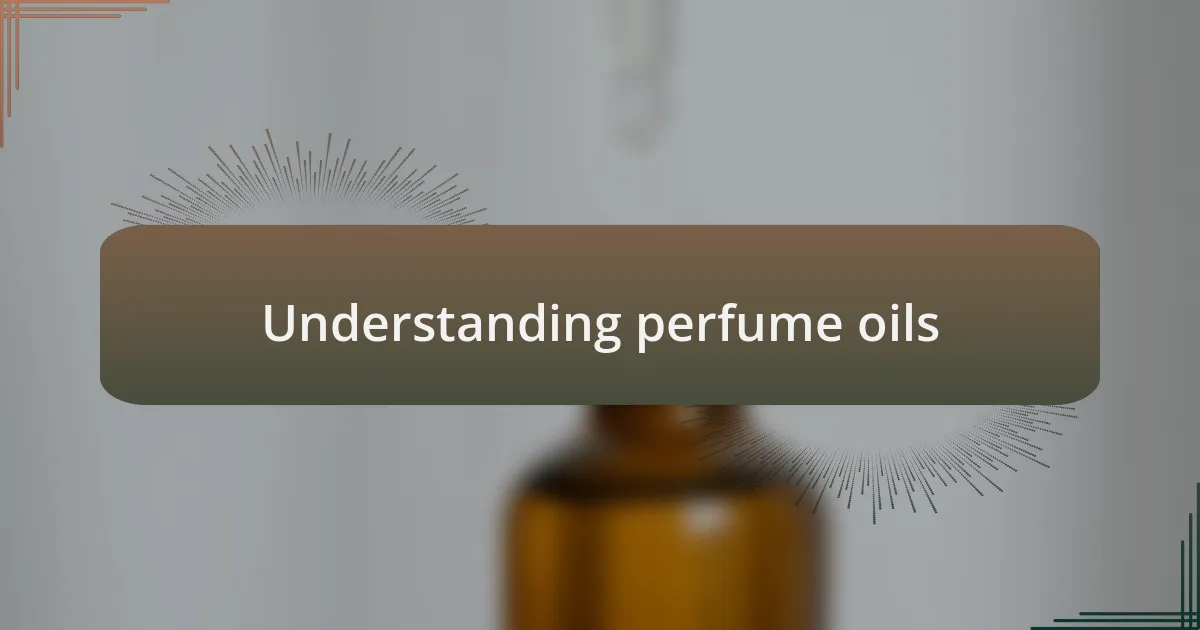
Understanding perfume oils
Perfume oils are a fascinating alternative to traditional alcohol-based fragrances. Personally, I’ve found that the absence of alcohol in these oils intensifies the scent, providing a richer and longer-lasting experience. Have you ever noticed how some perfumes fade quickly? With perfume oils, that lingering scent often stays with you throughout the day.
Understanding the composition of perfume oils can also enhance your appreciation for them. Unlike standard perfumes that contain a mix of alcohol and fragrance, oils are typically made up of pure fragrance extracts mixed with a carrier oil. This not only gives them a smooth texture but also makes them more skin-friendly. I remember the first time I applied a jasmine-scented oil; the way it melded with my skin was simply mesmerizing.
It’s interesting to consider how the application process of perfume oils differs from that of traditional perfumes. While I usually spritz a traditional fragrance, with oil, I gently dab it on pulse points, allowing the warmth of my body to amplify the scent. This unique way of applying fragrance can transform your ritual and deepen your connection to the fragrance. Have you tried this method? It might just revolutionize how you experience scent!
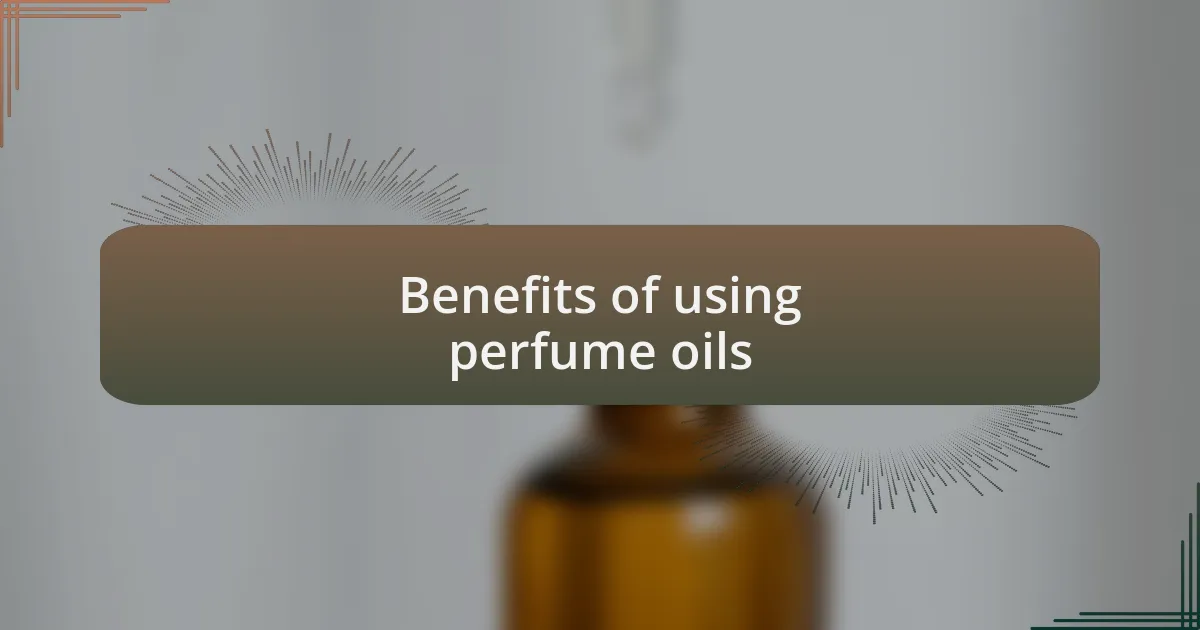
Benefits of using perfume oils
The benefits of using perfume oils are quite remarkable. For instance, I appreciate how perfume oils are often more concentrated than traditional fragrances. When I first applied a sandalwood oil, I was surprised by the depth of the aroma. It felt more intimate, as if the fragrance was an extension of myself, rather than just a scent I wore.
Another great aspect is their skin-friendly nature. Many perfume oils are free from synthetic additives, which can irritate sensitive skin. I once had an experience where a popular fragrance caused a rash on my arm. Since switching to oils, I haven’t had that issue. This shift allowed me to explore more fragrances without worrying about skin reactions.
Additionally, perfume oils typically last longer than their alcohol-based counterparts. The other day, I put on a rose oil in the morning and, to my delight, caught a whiff of it in the evening. It was like a little reminder of my day, a scent unearthing pleasant memories. Isn’t it wonderful when a fragrance can carry moments with you?
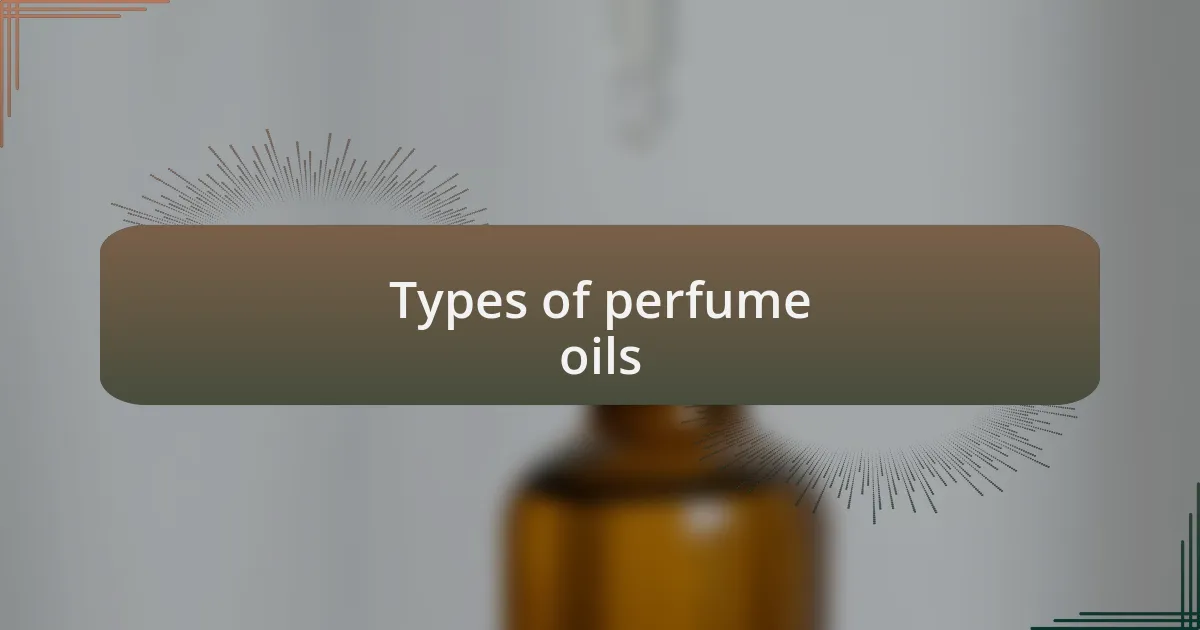
Types of perfume oils
When it comes to the types of perfume oils, there are mainly two categories to consider: single-note and blended oils. I remember the first time I tried a single-note oil; it was a crisp bergamot. The simplicity was refreshing, like a breath of fresh air. I found it was easy to layer with other scents, allowing me to create a unique olfactory experience every time.
Blended oils, on the other hand, often feature a harmonious mix of various notes, crafting a more complex fragrance profile. For instance, I once came across a jasmine and sandalwood blend that transported me to a serene garden at dusk. The balance in such a blend can evoke emotions and memories, and it’s fascinating how one sniff can take me back to a specific moment in time.
Another interesting category to explore is the niche perfume oils. These are often hand-crafted by independent artisans and may not be as widely available. I stumbled upon a small boutique that offered a vanilla and amber combination, and I immediately fell in love with its warmth. The story behind these niche oils adds an extra layer of charm, making each scent feel special and uniquely personal. Have you tried any unique blends that have captured your heart?
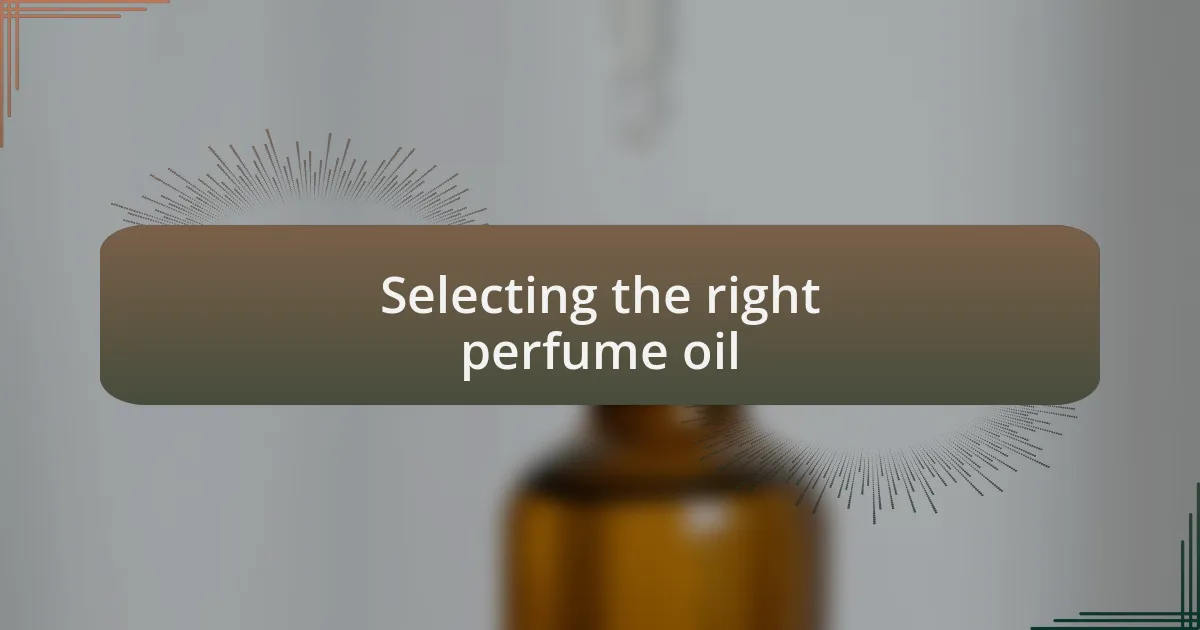
Selecting the right perfume oil
Selecting the right perfume oil can feel overwhelming, but it’s truly about personal resonance. I remember once wandering through a market and being drawn to an earthy patchouli oil. It felt like a warm hug that instantly matched my mood; I realized how important it is to choose a scent that feels right for you at that moment. Have you ever experienced that attractive pull towards a specific aroma?
When choosing, consider the notes that tend to uplift you. For example, I often gravitate toward citrus scents for a burst of energy, particularly when I need a boost during a long day. Each fragrance carries a different vibe, and understanding what works for you personally can transform your selection process into a delightful experience.
Additionally, don’t shy away from sampling before committing. I once spent an afternoon testing various oils, and I discovered an unexpected affinity for a spicy cardamom blend, which surprised me. The act of trying different scents allows you to connect with fragrances on a deeper level, ensuring that the oil you choose reflects not just your taste, but also your personality. What scents bring out the best in you?
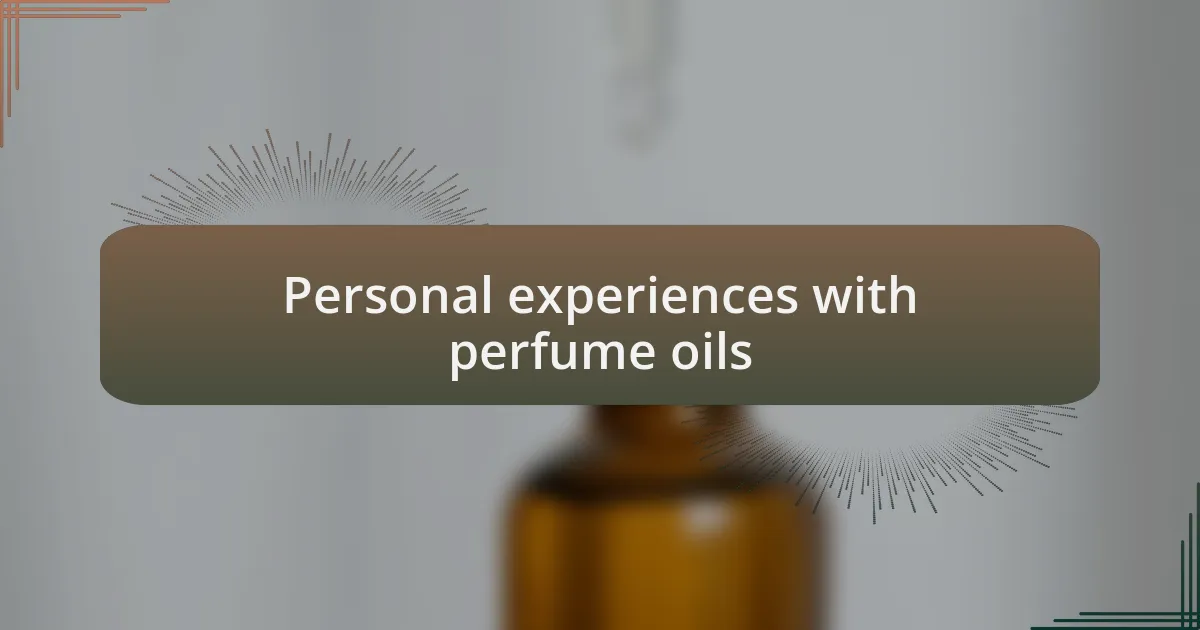
Personal experiences with perfume oils
I’ve found that my experiences with perfume oils can vary significantly depending on my mood. One evening, I decided to try a rich vanilla oil while winding down at home. The creamy sweetness enveloped me in comfort, making it a cozy evening. Isn’t it fascinating how a scent can completely enhance your emotional state?
There was another time when I attended a summer picnic and opted for a light, floral blend. It was refreshing and perfectly matched the sunny day. I recall how several friends complimented me on the fragrance, sparking conversations about our favorite scents. Have you ever noticed how certain aromas not only uplift you but also draw people closer to you?
Additionally, I’ve learned that the longevity of these oils can differ, which adds a layer of complexity to my selection. Just last week, I wore a vibrant jasmine oil that lingered throughout the day. I found myself catching whiffs of it during meetings, which lifted my spirits. This experience taught me that selecting a fragrance isn’t just about enjoyment in the moment but also about how it resonates with you over time. What experiences have you had that might influence your choices?
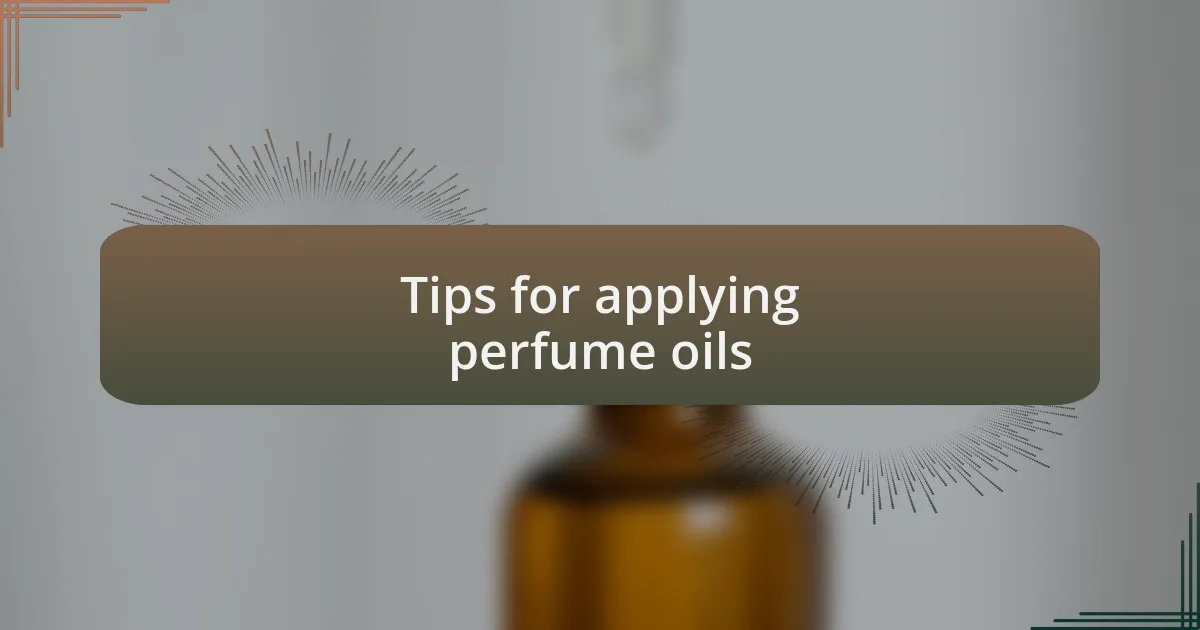
Tips for applying perfume oils
When applying perfume oils, one of my go-to tips is to warm the oil slightly in my hands before applying. The warmth helps release the fragrance and makes it easier to layer on the skin. Have you ever noticed how a little body heat can transform a scent? I think it creates a richer olfactory experience.
I also prefer to apply perfume oils on pulse points like my wrists and behind my ears. These areas tend to emanate heat, ensuring the scent diffuses throughout the day. Interestingly, I once applied too much oil in a rush, and all I could think about was how overwhelming it felt. It taught me the importance of moderation— less can truly be more, especially with concentrated oils.
Lastly, I’ve found that applying lotion beforehand can enhance the fragrance’s longevity. I remember using an unscented lotion before my favorite sandalwood oil, and the combination was magical. It not only allowed the scent to last longer but also made the application feel more moisturized and comforting. Have you tried this method? It might just change your whole experience with perfume oils!